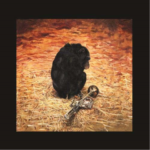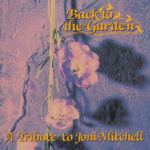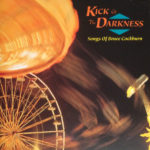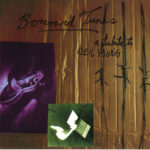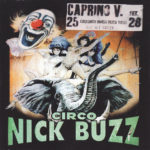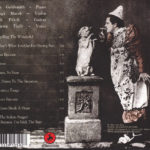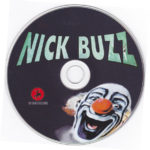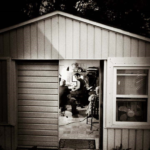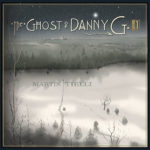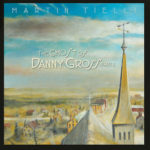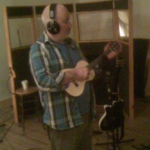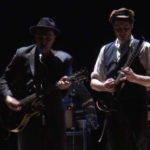The Martin Tielli Interview 23Aug2013 – Part 1 of 4
Martin Tielli used to work as a Scientific Illustrator at The Royal Ontario Museum. Then he joined a band called Rheostatics with Dave Bidini, Tim Vesely and Dave Clark (later replaced by Don Kerr and then Michael Wojewoda). He painted and sang and played guitar and wrote songs for 20 years. They became popular, not so much in a mainstream way, though they had one hit with Claire in 1994. They were giants to those who really got what they were about. Some consider them the best band ever to come out of Canada. Between Movie Soundtracks, Children’s albums, Music about Painters, Prog/Pop/Punk albums, dope fiends, shaved heads, variety stores, arms sticking out of the snow, dogs and observatories sharing names, fish, boats, water, monkeybirds, Saskatchewan, cannibalism, WKRP based invasions from space, Barenaked Ladies, Bourbons, 3 drummers, fake opening bands, guest musician nights, fights, boozehounds, jokes, laryngitis, more fish, cats called happiness, girls singing songs in Portuguese holding stuffed chickens, they were certainly one of a kind, the likes of which will probably never be seen again. They broke up in 2007 after 10 studio albums, one movie soundtrack and one of the best Live albums ever released. They tried for a 4 show reunion in December 2012 but it fell apart just prior, pissing off some and disappointing others amidst claims of demons and stage fright. Martin’s other band is Nick Buzz who released their first album Circo in 1995. Their second, Berlin Cabarets was released in 2010 as part of Martin’s 2003 Subscription Series of 4 albums. A Quiet Evening At Home is the brand new album and again features Martin, Rob Piltch on Guitar, Hugh Marsh on Violin and Jon Goldsmith on Piano/keyboards. He has worked on 4 Movie soundtracks and several art exhibits. Now residing near
Hamilton Ontario there is much to talk about with Martin from Rheostatics to Nick Buzz, Painting to Video Production, Interventions to Stage Fright. I spoke with Martin about these topics and many more over the course of 9 hours on August 23 2013 with flashlights on our heads around a bonfire in his backyard. It contained the most insightful, honest and frank information I’ve ever read from him.
Darrin: I was originally going to ask you about the origins of Nick Buzz which you can talk about if you want but I did notice there is a whole history on the website. I’ve got a bit of insight into that but if you want, do you want to talk a bit about where Nick Buzz came from? Obviously you have a new album that came out this week.
Martin: Well I’ve probably been with them longer than with the Rheos.
D: Your first album came out in 1995 or 96?
M: Yeah, but we recorded it before that. Sort of like this, one over a couple of years. Really it was around the time of doing Introducing Happiness and Whale Music I was also recording the Nick Buzz record slowly but surely. Late at night a jingle studio down at Spadina and King in one of those nice old Art Deco buildings.
D: There is also history associated with the Art of Time Ensemble
M: Yeah A long time after that. Andrew Burashko started Art of Time…Is Art of Time, he was a big fan of the Circo record and he wanted us to inaugurate his whole concept, which was having people in other fields of music interpret things like Schoenberg and collaborate with classical musicians.
D: But you were playing with them a long time before that.
M: Yeah, me, Rob Piltch, Hugh Marsh and Jon Goldsmith.
D: I read on the website that your introduction to them was a Bruce Cockburn show at Convocation Hall.
M: I kept meticulous journals back then and I was able to read them my journal entry from that concert in which I describe seeing all of them and what I thought of the concert. I think I was 13 or 14…it is quite funny.
D: So how did you get involved with working with them initially?
M: I was star struck when I first met them. First it was probably Hugh Marsh so it was like “Holy Crap”! How did I meet them? I was playing with Chris Tate from Chalk Circle and Hugh was playing with him too. Mary Margaret (O’Hara) wouldn’t play on this song for this Joni Mitchell Tribute album that was on Intrepid records which The Rheostatics were on. That was back when tribute records weren’t… I didn’t even like the idea when it first came out really. You get a bunch of lesser known artists to pay tribute to somebody famous so you are guaranteed to sell a certain amount of records, because of the Joni Mitchell name or the Bruce Cockburn name. I think they actually came up with that idea. It wasn’t a thing yet but it later became a thing…it still is. The notion of tribute albums hasn’t gone away.
D: Was that around the time of the Kick at the Darkness album or was that before that?
M: It might have been after that.
D: BNL were on that with Lovers In A Dangerous Time…
M: Yeah I was on that album too. Me and Jane Siberry did a duet of “Long Time Love Song” with the Creegan brothers from the BNL…well the album that made me want to play music was Joy Will Find A Way by Bruce Cockburn. I’ve done many songs from that album because it spiked me at the right time in my life.
D: We were talking earlier about the Farmer In The City tour and the fact that you were playing Arrows of Light and Joy Will Find A
Way…
M: Which are songs he’s playing again, last time I went to see him. And I got a chance to thank him for playing Arrows of Light.
D: You guys did a great version on the recording I have and when I was talking to you in the past about cover albums … I’m skipping from the first question to the last one…That was one of the reasons why I thought “Wow, that would be such a great thing for you to do” as far as doing a covers album…but we’ll get to that question later. The Bourbon Tabernacle Choir and you also did a song around the same time…
M: Another tribute album! Borrowed Tunes, Everybody Knows This Is Nowhere.
D: …which was without a doubt the highlight of that album. I still consider that one of the best Neil Young tribute songs by any band.
M: It was so ridiculous…so many people in the studio it was nuts. There was no thinking about it. It was pretty much a free for all … OK Banjo…3 basses….
D: What made it so great was …
M: …singing with Kate Fenner….
D: There was a sense of fun and freedom and really just enjoying the moment. It didn’t seem like a preconceived… we have to make it sound like this because we’re doing a tribute song on an album. It sounded like a couple of bands coming together and having fun. And it shows through on that recording.
M: That’s exactly what it was. It actually was like that. It was a fun time. Everyone was doing that. Like we were talking about earlier if you’re a friend of the band…being the ladies or the Bourbons or whoever were in the audience, were going to be on stage eventually. There wasn’t the pressure of anything being “I paid to come see these guys”… that kind of shit wasn’t a notion. But everyone was hanging out everywhere around those years. Even though our styles didn’t really relate to each other at all… It was weird… Other bands were like the 13 Engines. They had more in common with us than the Bourbons but the music was a completely different language. The Barenaked Ladies were a whole different thing. All of these bands were not like each other but we didn’t care. It was nice like that. Nobody was touring ridiculously. People were going out and doing their gigs and it was actually a social occasion.
D: …and bands would go out and see each other not from a competitive perspective necessarily but because they were friends.
M: There was definitely competition there but it was of the healthiest kind … like “that guy can play guitar, I better practice!” Actually, that’s not really competition at all is it? More like inspiration.
D: So Circo you guys brought out in about ‘96.
M: Something like that. It sort of crept out. I’m as proud of that album as I am of Whale Music or Melville.
D: Why is that?
M: I think it’s as good and better in some ways. The songs were all fully realized. And it was weirder. There’s no drummer. It was not a “rock band”.
D: It’s an interesting thing about Nick Buzz. You guys have done 3 albums now, along with Circo and The Schoenberg Album which was a much shorter and stylized album.
M: That was a live off the floor, a five hour recording session in Hamilton.
D: And that was part of the Martin Tielli 2003 four album subscription series. It’s interesting because the title of the new album A Quiet Evening At Home … I expected it to be ironic and it actually is not. It is a far more pastoral and old school European element to it. I don’t know what that means but there is an element to it that I find to be drawing on things not of this continent in its style. Maybe it is because of the lack of drums but Circo was a far more diverse sounding record; more chaotic in its nature from song to song.
M: Circo was written as we were recording it. We’d literally go in and I’d bring them a song on guitar. They would hear it once and we would play it. Usually 4 or 5 takes in we’d have the whole thing roughed out. Then we would start overdubbing and I’d go home with the song finished. We futzed with it in terms of production a bit but not much by current standards. I’d see the list of songs growing and I’d go, “OK we have two sort of introspective songs here now we’ve got to bring out the clowns. It’s time for the show to begin. OK, this album doesn’t have an intro song”. So I wrote Spilling the Wonderful…”Step inside”… it was written as a show, a variety show and I thought I don’t know how I’m going to get these guys to tour because they were all doing different crazy things at the time. I wanted to make an album that sounds like a show. But with this record it was sounding like a quiet evening at home. Because not having drums in the band, we’d go to Rob Piltch’s basement where he has an old upright piano, his guitar stuff. I don’t have to bring anything because I just. Hugh would bring his gear and we would literally sit around in Rob’s rec room and play. I don’t need a microphone. It is so great to not need a microphone at totally acoustic volumes. Most of those songs were conceived in that way.
D: Which is interesting because it is a very intimate sounding record.
M: It was too intimate sounding to me at first, but then when we started working on overdubs. and began formalizing things and taking things out -but for a while there I was really worried that it was too…first of all I had a cold when I sang all the songs and I was worried about that. And it was just so mellow.
D: But it’s not that it is mellow, there is an intimacy to it. I was thinking about it in relation to The Ghost of Danny Gross, the double album that was part of the subscription series as well. That’s a very intimate sounding album in some ways as well but this one to me sounds more…there is an at ease element, very close to the mic sounding element, to how you sing most of the songs on it. There are a couple of songs where you get that Circo sort of bizarre-ish kind of stuff but it isn’t really hitting the same kind of level as that. It is far more of an intimate sounding record to me to the point that the last song on it, which is The Birds of Lanark County, sounds to me like the most intimate song I’ve ever heard you record. There is a sincerity and honesty to the execution of it all. So when you went into that I guess it was more of a product of the environment than an attempt to…I guess the question is were you thinking about having to write an album that was reflective of the work you had done in the past with them or was It just an organic extension of what you had done together?
M: It was a logical…even with Circo we began to contrive it as a show but that wasn’t the plan when we set out to do it. It started to reveal itself, although it must have been in the back of my head. If anything when we started doing this album our headspaces were all …I’m always going “well what is everything I hear like?”, because I want to offer something that is a bit different. Back when Circo came out everybody was just discovering Neil Young and trying to be really casual and rockus and I was like “I’ve had it with that”. Enough people are doing that. I love that and that’s where I came from but I’ve been listening to Jacques Brel and all kinds of strange music that is formal and the mode of operation is we’re going to take you on a trip – here’s a sad song…well here’s a happy song cause that’s what life is like. It’s not all sad and this is going to be a full rounded show. Maybe when it came to this album it was like we can’t do THAT again unless we somehow torqued it up 200%. Everybody’s waving their arms and trying to get noticed and we’re not going to do that. I don’t do that. Let’s not do that. If you ever do something that’s like “look at how good I am, look how sensitive I am, look at how anything I am” then you’re not singing for real.
D: You moved out of Toronto 3 years ago and it seems like maybe the essence of it is more reflective of the world you are living in at the moment.
M: Inevitably
D: And that removal from the big city environment to something that is more pastoral
M: And a removal from the music scene completely.
D: There is an organic sound to it. The guitars are all acoustic. The little bits of drumming are all bongoish or beat-ish. It’s not a drum set. It’s piano which is all string. You’ve got a violin that at times sounds like a broken record.
M: (laughing) and a lot of organ.
D: Maybe my thoughts of it having a older European folk kind of flavour to it is in essence a return to nature kind of feeling more than anything and that organic kind of sound of the instruments. That’s the feeling I’m getting from listening to it.
M: Yeah – the naked tapes were way more like that. At our recording sessions nobody talks. It’s so peaceful. It is antithetical to every other scenario I’ve ever recorded in. It’s always been like that with these fellows though.
D: So do you write collectively with them? Do you sit down and start jamming? Well, on Circo you said you came in with songs but on this one some of the songs obviously go back a few years.
M: Like the Rheos it is pretty collaborative, but with Nick Buzz a lot of the stuff were things that they had already written. There was a vocal melody already written into it and I had to write lyrics and restructure things to tell a story. The Happy Matador I worked on for months and months to get it right but that was a fully realized song that Piltch wrote. Some of the stuff like Sea Monkeys there was a time there where they were in the studio without me and they ended up doing these massive 10 or 12 hours of strange…non-Pro Tools looping. Hugh Marsh has this collection of Folk Tech instruments that are a combination of digital and analog gizmos that sort of sequence, sort of loop things but in a way that is really hard to predict; bizarre and beautiful looking instruments. Little works of art in and of themselves. And I wrote stuff to that, to hours of the sounds of clanging nothingness…not nothingness but sounds not even notes.
D: Those are two songs that jump out at me listening to it in the initial phases. One is Sea Monkeys, which for some reason lyrically there is a sense of something that reminded me of IT from Melville. Not from content but from the sentiment of drawing on lyrically feels like childhood reflections. “I am science boy I grew up on dinosaurs”. It seems to be drawing from a similar vein.
M:– that’s funny. That makes sense.
D: The Happy Matador when I read that, to me it was something reflective of your relationship with Selina Martin. It reminded me of a conversation you were having with a previous person you were dating.
M: Well there’s a lot of that all over the record really. Not spelled out but it’s under it all. That is not really remarkable, is it?.
D: It s a great song and it is one of the ones that has the essence of that Circo kind of sound, being a little more circus in nature.
M: Yeah and exotic places that are obviously fantasy. “The Happy Matador” was the name of Rob’s melody. But well you know it’s strange, most of this record is thinking about that relationship and the nightmare that ensued.
D: I know that her album that she brought out is about (Disaster Fantasies) you guys.
M: We were still together but falling apart…I helped her demo those songs.
D: OK I’ve diverged – The fourth album in your series was originally something that was going to be called New Gold with Jon Goldsmith.
M: It eventually got incorporated into the Danny G albums.
D: That ended up at the end of Part 1 of Danny G. That was going to
be New Gold?
M: All these beautiful movements Jon had recorded with orchestra. He said why don’t we write songs to them and I said “Jesus Christ yeah!” which is something we’ve always done, but these were really big. I thought that those could eventually be a whole album by itself but it didn’t quite get there.
D: So Danny G was originally going to be one of the albums but eventually became two of them with that incorporated into it.
M: Now it’s going to become one again.
D: To be released publicly again?
M: That’s the plan with Six Shooter (Records). Soon. I’ve already distilled the songs and re-edited things and it is sort of like a best of that collection.
At this point we start talking about starting out as a musician and the difference between playing music and playing live.
M: When the song starts you gotta play the song from top to bottom. That’s a big lesson right there. You have go from your basement to being in a band which is a massive step. I remember thinking “Oh my god I have to pay attention to so many different things”. Not only just being nervous about it because it is scary but I have to listen to the drummer. Who would have thunk? And now I have to understand drumming and, oh cool, you have to listen to the bass drum. How awesome is that? Weird and cool and fantastic. Then you learn maybe I should lay off on the beginning of this song and not jump into it like I’m about to commit suicide right off the top of the song. Maybe I let the first half of the song breath and then get intense. You learn that lesson maybe the second year of playing. The hilarious thing about young bands, or, like the Rheos from 1986 until 1990, was that we would have so much nervous energy that it would just almost destroy the… It would be silly. Hilarious!
D: There is a youthful manicness to it all right?
M: First of all every song live is 80bpm faster than it is supposed to be.
D: But I think when you move out of your basement and into a band you are learning about your musical relationship to other people, but at the same time you have to develop an actual relationship with the people you’re working with in a way that is collaborative versus the narcissistic self-serving playing in your basement, or in isolation.
M: You have to learn to explain yourself to other people. Let them know what kind of music you are stealing from or where you are coming from or introduce them to the kind of music you like and understand what kind they like.
D: Is there a difference between that experience with the Rheostatics in your early years and working with Nick Buzz now as an older more seasoned kind of musician?
M: I don’t know because those guys are my elders. They are the generation before the Rheos and I was in a way going to them to learn more. They have a whole other level in a different world.
D: So do you think you work with them in a different way than someone you would consider a peer of your own generation?
M: I may stand off more because I don’t operate in their realm. So I don’t interfere. But they listen to me as much as I listen to them, which I don’t know if I deserve sometimes but they like what I do as much as I like what they do.
D: I wonder if they don’t look at that relationship in the same way at all.
M: Possibly not. I’ve talked to them about this strangeness and they know how I feel. I don’t understand music. They can read and write it inside and out and can play anything. I can’t play what they can play but they can play what I can play. I’ve met musicians like that who can’t “rock”- whatever the fuck THAT means- but these guys can, and then some.
D: So was there an awe kind of sense from you working with them originally? Did you feel like you were working with people you probably shouldn’t be working with? I don’t feel I have the right to be playing with at this point?
M: No, I knew I did something they didn’t do. I was the singer. I was the guy who tells the stories and they don’t do that. None of them sing. I can write catchy songs that tell stories so that was my job. So it’s not like I felt inferior. I felt like I belonged there. And I’m not denigrating the skills of the other Rheos against Nick Buzz -it’s just that I knew what Rheos were doing because I do the same thing, but when Goldsmith plays piano, when Rob plays guitar, they are thinking somewhere else. It is also very peaceful where they are.
D: So do you play any guitar on the albums?
M: I embellish. It’s Rob who is the guitarist. A bit of that was really like…in my solo band I didn’t want Ford Pier to play guitar but he refused to play keyboards and he’s a great keyboard player. I played in the Rheos and I had to fight with Bidini all the time for this guitar space, and guitars go out of tune and inhabit the same tonal space. You get sick of that after a while. I wanted in my solo band to play guitar- to be the only guitar player. I like units where every player inhabits their own sonic space and they take care of that like that part of the composer’s brain in the symphony. The bass player takes care of that realm and sometimes travels out of it but everything has its own sonic space. I loved rock trios like The Police. On their early records you could hear the bass and it left a lot of space in its corner and the guitar was there in that corner and the drums are there and everything just shone.
D: Maybe to answer my own question then is that you are bringing to them what they don’t possess or aren’t as comfortable with so maybe there is an equivalence of perception there about what you are bringing to the table versus more a collective pure… not that their not pure…when you start a band with a bunch of friends you are hanging out with and everybody is learning as they go, which is probably more of a Rheostatics, versus walking into an environment where you are working with people that you perceive as more seasoned, who you have a lot of respect for what they’ve done.
M: Although when I joined the Rheos I was joining old guys as far as I was concerned.
D: You came in after they had already been working together.
M: Yeah and they were already popular. I was joining the big band on Queen Street and I was intimidated. I probably wouldn’t have joined them because I didn’t like their music particularly, but I knew they were better than me and I had some shit to learn from these guys, and they put on a show. They actually got up in front of people and did stuff. That in itself blew my mind.
D: This was at the end of the Trans Canada Soul Patrol era so it was a different band from what people perceive of them being now.
M: I think I would go downtown to Queen Street and see them throughout the Trans Canada Soul Patrol times, which seemed like a long time but was probably only a year or two. It was impressive you know? A horn section hits you in the stomach. They were a really entertaining band to see and I couldn’t believe how outgoing they were, but they were a party band. It’s not my kind of music. They were an R’n’B Funk band. I was trying to get them to go back to that towards the end but they almost seemed embarrassed about it. I really thought this would’ve been an interesting place for us to have gone at that point. Let’s do a dance record, I’m into it now. I didn’t understand it back then. You had me playing funk licks and I didn’t even know what that kind of music was. It was a great education.
D: It’s funny cause with the Bourbons were a soul funk kind of band but as they went on they ended up with Chris picking up the trombone and Dave playing trumpet so as they got towards the end of what they were doing they would have Chris, Dave and Gene playing a 3 piece horn section for lots of song….and has no relation to my question…..
M: (laughing) I once ruined one of their shows. I was on this kick where I’d do lights and to really enjoy the show it was kind of like jam with the band. I would ask the sound guy “Can I do the lights?”, because no one was doing them. Well it turns out the light board at The Rivoli was so damaged I was being cautious and finally I was getting really into it and in the encore I hit something and it all went black. I was going over the top too. I was too into it. Anyway if they ever read this interview I still feel awful about it 150 years later.
D: For you it’s probably a major thing that you remember but they probably have no idea what you are talking about. It’s interesting though, the sonic space you are talking about. One of the things when you end up with multiple musicians on instruments, when you end up with dual guitarists, you do end up with the ability to build harmonically or I guess with the Rheos. Dave would generally tend to be in the rhythm section and you would solo on top of it.
M: I viewed myself as the horn player or the keyboard player because he’s going to play straight up rhythm guitar with the odd lead. He’s a great rhythm guitar player, way better than I will ever be. I tried to understand his wrist forever but I just don’t have it. It’s like one of those things you are born with.
D: Are you aware of how people perceive you as a player though with respect to the context of that band? And what you are bringing to the table as far as that sonic realm.
M: Yeah Totally. And what every bridge and every note has to do for the song.
D: But you guys were able to communicate with each other really well on stage on the fly.
M: At our best, yeah. That was the really good thing. When we were really good it was transcendent.
D: That’s what I think for a lot of people…you know… Rheostatics fans have moments where they go from observers to being engulfed in what was going on and there was a very personal thing were all of a sudden you go “Fuck I get this”. It becomes very personal and a lot of it had to do with that kind of aspect of playing, and the intensity of the sonic landscape; the type of playing that was going on. With the Rheos there were a lot of elements that people were drawn to. Some people were drawn to elements of the poppier side of something like Claire. Some people were drawn in by something like A Mid Summer Night’s Dream which is a totally different end of the spectrum. But as a band what I think was great about it was that each of you kind of brought different elements to it that collectively…there was a synergy that made it something completely greater than the sum of its parts. It’s not just you singing and playing your songs or Tim or Dave doing their songs. In the bigger picture of it all there was a canvas woven over the course of a show that took you through all sorts of levels of intensity, from whimsical, funny. It was as much a comedy group as it was band at times.
M: (laughing) yeah sometimes.
D: That wasn’t actually a question that was me preaching.
M: But that was the goal, you know, to get to places like that. Shouldn’t that be every band’s goal? And we didn’t succeed all the time. The thing with trying to make things actually happen is that you are going to fail. Half of it is going to fail. That gets rotten when you can’t deal with that. But when you don’t care about failing it’s the most fun in the world.
D: Well when you are on stage and in the midst of it, it is a very different experience then when you’re in the crowd watching it. Things that to you fail onstage don’t necessarily translate in the same way to what the audience is experiencing. The failures in some ways become a part of what makes people get drawn into the experience of the live show. Not that you go to see people perform shitty.
M: Yeah when I go and see people it doesn’t bug me when they don’t nail something but when you are doing it you really have to try to not let it get to you. It’s really hard but as an audience member I could care less. I’m not going to see the record.
D: That’s what I think with the Rheos was a key thing.
M: (laughing) Well sometimes they wouldn’t get any of the record. We got slagged so much for that.
D: I’ve never seen as many musicians in a crowd as at Rheostatics shows. It’s funny I remember going to see you guys and turning to people and saying “You know I just might as well give up at this point altogether as a musician”. Because you’d have that kind of experience at a show where you would think “I can’t imagine being in a situation where I could do what they’re doing” and I think that was the effect it had on the people that were observing, musicians included. “Wish I could do that!”. The humor or all of it.
M: Comedy in rock. Not enough of it.
D: The people who got it LOVED it. There was an element to it where you felt like you were in on the joke or experience. You were a participant in the event.
M: Cause they were. It’s not like we’re doing something special. They can make suggestions. It’s almost a challenge.
D: But some of what would draw you in would be the rhetoric between songs; the joking around. The fact that you guys had such great senses of humour and were able to spontaneously come up with stuff that would make people laugh out loud like they were seeing a comedian. There was some funny shit you guys said. Some people would want you to just play the songs and move on but I think that the people who really dug the Rheos and loved what it was all about, that was a part of the experience. It was being in on, or part of the joke, or getting that humour side as well. There was a lot of intense music that was involved in it. There was levity in the balance of the humour and intensity.
M: That was our point in a way. You could make jokes and then do something that was absolutely serious and sincere. One doesn’t negate the other. In fact I don’t trust people that can’t make fun of themselves. You don’t have to be reverential. That sort of ruins everything. As soon as something becomes holy it’s awful. To me it ruins the experience of anything because you have to like it. I don’t want to be forced to pay attention to anything. And just because you can find humour in something doesn’t mean that it is not very serious. It seems to confound people. They want their sad music prepackaged and wrapped up in a sad black bow. What I continue to be on about is that this is not the case. There’s something wrong with THAT.
D: In some ways its actually what you were talking about with respect to Nick Buzz and the balance of reality as far as having something that is completely out of left field and out of kilter followed by something that is as serious as you could possibly write and the reality of the world that you live.
M: That’s what life is like.
D: With the Rheos the interesting thing is that the fans, the people that loved the band, didn’t love all of it and were critical of it. Just because you love the band doesn’t mean you are going to say this was the best show you ever saw. People would walk away and say “That was pretty shit” or there were some parts that were great and some parts that were shit or enjoy the fact that you would make fun of each other’s songs in the middle of a show; things that you just don’t expect from a live scenario. That to me is what was unique about it. I’m off on a tangent at this point.
End of part 1
PURCHASE Circo, or A Quiet Evening At Home by Nick Buzz and The Ghost Of Danny G Part 1 and Part 2 by Martin Tielli
